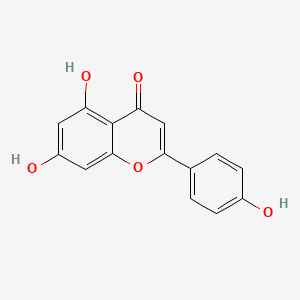apigenin
apigenin is a lipid of Polyketides (PK) class. Apigenin is associated with abnormalities such as Morphologically altered structure, Chimera disorder, Hypertensive disease, infection induced and Infection. The involved functions are known as inhibitors, Gene Expression, Process, Metabolic Inhibition and Cell Death. Apigenin often locates in Vacuole, Cytoplasmic matrix, Cytoplasm, Tissue membrane and Membrane. The associated genes with apigenin are MSMP gene, BCL2 gene, PTGS2 gene, Chromatin and SLC33A1 gene. The related lipids are Lipopolysaccharides, Steroids, 1-Butanol, agosterol A and Butyrates. The related experimental models are Mouse Model, Tissue Model, Knock-out, Xenograft Model and Disease model.
References related to locations published in Carcinogenesis
| PMID | Journal | Published Date | Author | Title |
|---|---|---|---|---|
| 10753197 | Carcinogenesis | 2000 | McVean M et al. | Increase in wild-type p53 stability and transactivational activity by the chemopreventive agent apigenin in keratinocytes. |
| 15090468 | Carcinogenesis | 2004 | Svehlíková V et al. | Interactions between sulforaphane and apigenin in the induction of UGT1A1 and GSTA1 in CaCo-2 cells. |
| 18974065 | Carcinogenesis | 2008 | Hu XW et al. | Apigenin inhibited migration and invasion of human ovarian cancer A2780 cells through focal adhesion kinase. |
| 17071632 | Carcinogenesis | 2007 | Fang J et al. | Apigenin inhibits tumor angiogenesis through decreasing HIF-1alpha and VEGF expression. |
| 23161610 | Carcinogenesis | 2013 | Byun S et al. | Src kinase is a direct target of apigenin against UVB-induced skin inflammation. |
| 24067903 | Carcinogenesis | 2014 | Shukla S et al. | Apigenin inhibits prostate cancer progression in TRAMP mice via targeting PI3K/Akt/FoxO pathway. |
